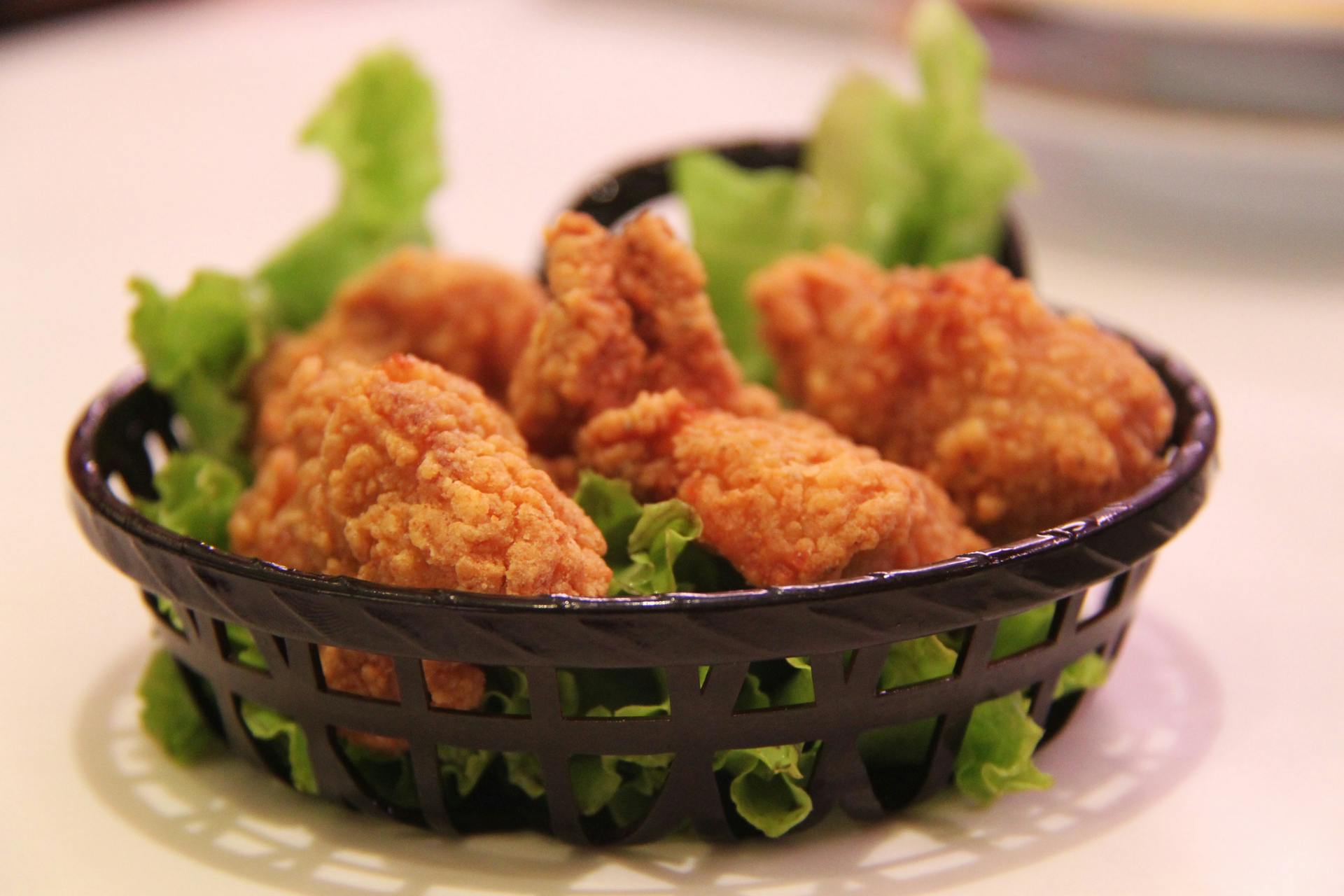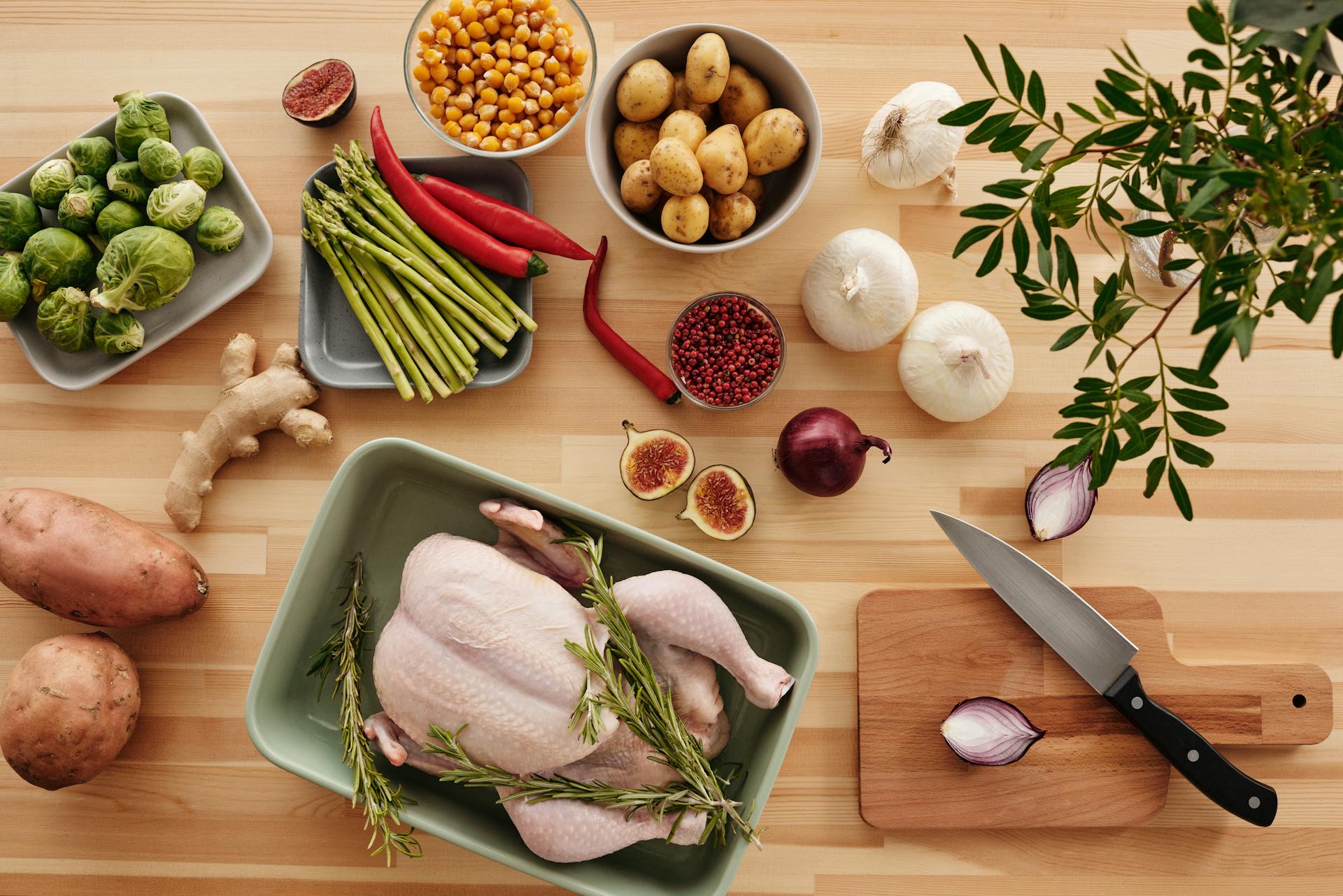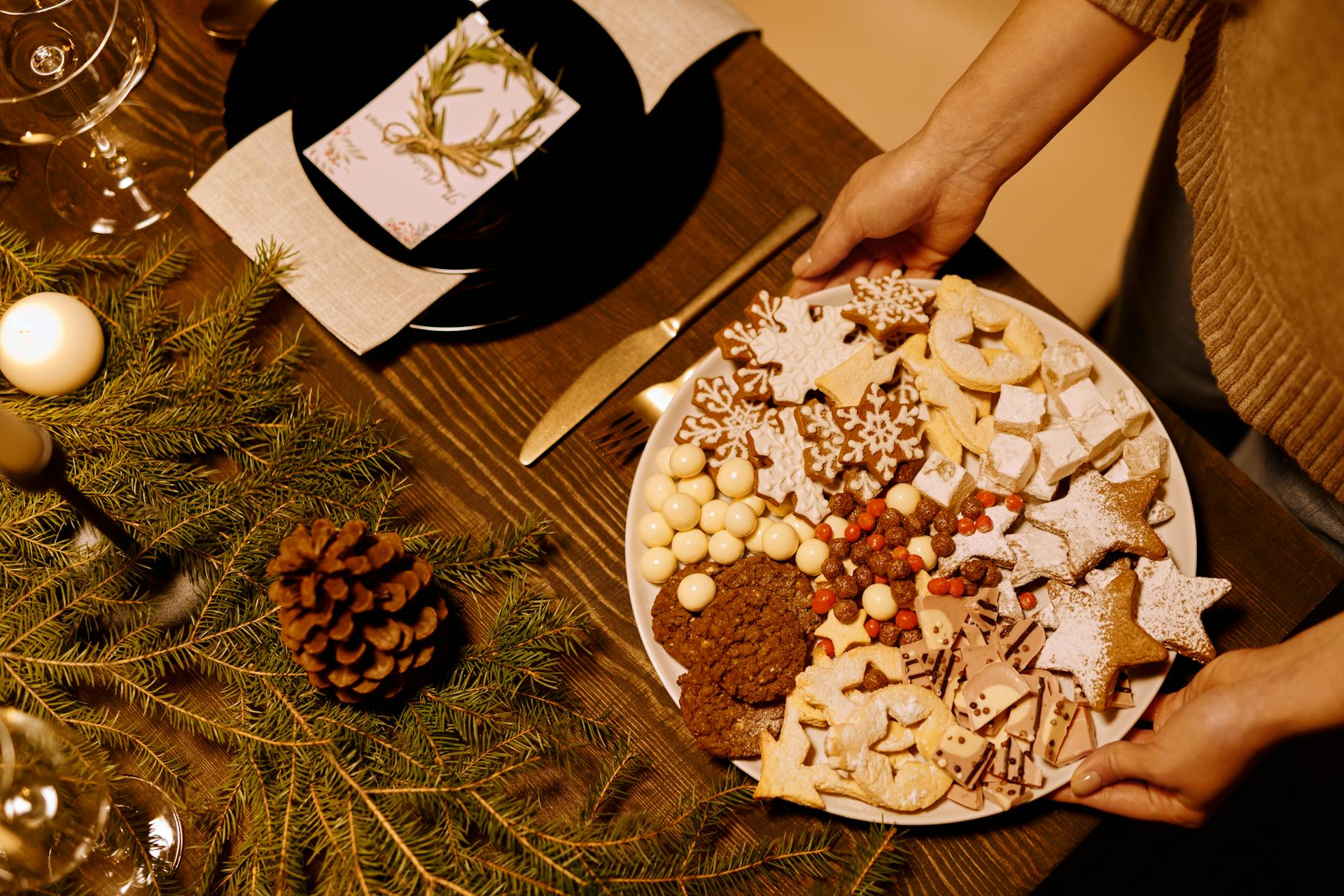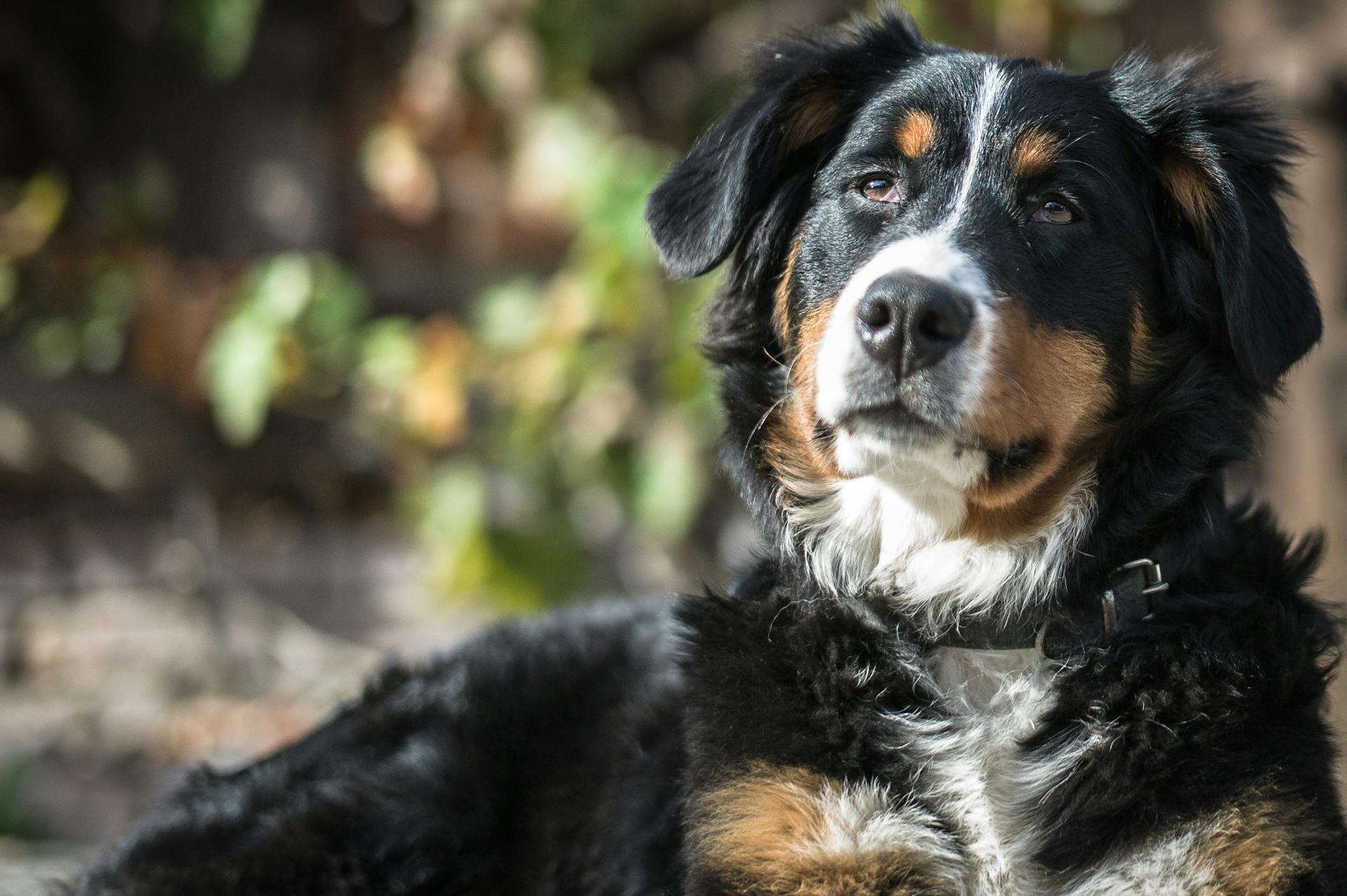
If you're looking to protect your backyard chickens from predators, a guard dog can be a great addition to your flock. Some breeds, like the Great Pyrenees, are naturally inclined to guard livestock.
Guard dogs need to be introduced to your chickens gradually to prevent stressing them out. This can be done by starting with visual introductions, then progressing to scent introductions, and finally, supervised interactions.
A good guard dog will be alert and vigilant, but not aggressive towards your chickens. The Akita, for example, is known for its loyalty and protective instincts, making it a great breed for guarding chickens.
Guard Dog Breeds
If you're looking for a loyal companion to guard your chickens, you'll want to consider a breed that's naturally protective and intelligent.
Livestock guardian dog breeds are perfect for this job, and they're often large, powerful dogs with a strong instinct to defend their flock.
Akbash dogs, for example, are intelligent and independent thinkers with a strong protective instinct, making them a great choice for guarding chickens.
Intriguing read: Bernese Mountain Dog Guard Dog
Doberman Pinschers are also excellent options, as they're loyal, smart, and athletic, with a strong ability to chase predators off.
Mastiff breeds, on the other hand, are known for their incredible size and calmness, making them natural guardians of your chickens.
These breeds require early and consistent training to develop into well-behaved guardians, so be prepared to invest time and effort into their development.
A consistent job is also necessary to keep a livestock guardian dog satisfied, so make sure you're providing them with a clear role and responsibilities.
With the right training and care, these breeds can be an invaluable asset to your farm or ranch, helping to keep your chickens safe and secure.
Guard Dog Care and Training
Getting your livestock guardian dog aquatinted with the chickens you need protected is crucial, as this helps them understand their role and builds a strong bond.
Early and supervised training is key to preventing bad habits from forming, so make sure to start training your dog as soon as possible.
To ensure your dog comes from a good working line, research their parents and look for a history of successful livestock guarding.
Getting your dog exposed to small livestock and chickens at a young age is essential for their development as a guardian.
Basic Training
Getting your livestock guardian dog started on the right paw is crucial for their success. Early training is essential, so it's best to begin as soon as possible.
Basic training with your livestock guardians will help them become an excellent guard dog. It all starts with their parents - do they come from a working line of dogs? This can give you an idea of their potential as a livestock guardian.
Getting them aquatinted early on with the livestock you need protected is important. This helps them develop a strong bond with the animals they're meant to protect.
Proper bonding with the livestock is key, and it's a good idea to expose them to small livestock and chickens from a young age. This will help them learn to work with the animals and become more confident in their role.
Broaden your view: Livestock Guardian Animals
Maintaining Containment
Maintaining containment is crucial for the safety and well-being of both your livestock guardian dogs and your animals.
We've tried various methods to keep our guard dogs contained, but the truth is, they will find a way out if they want to.
Keeping them free-range on our property wasn't possible because they wouldn't stay, even with electric fence.
Rotational grazing with sheep and pinning them up with chickens or sheep didn't work either, they'd just escape.
Cable runs in the pasture with meat chickens also failed, as they'd chase off predators and make a break for it.
It's essential to find a method that works for you and your dogs, but so far, we haven't found one that's foolproof.
Here's an interesting read: Breeds of Sheep Herding Dogs
Guard Dog Information
Guard dog breeds like Anatolian Shepherds need a lot of space to roam and explore, so make sure to provide a wide area or a secure fence to keep them contained.
They can be quite independent and may find ways to escape if not given proper supervision. Some farmers even attach a club to the dog's collar to prevent this from happening.
As a working dog, a guard dog like an Anatolian Shepherd requires regular training and socialization with all family members, including pets. This helps them understand their boundaries and not perceive other animals as threats.
These dogs are also extremely hardy and can adapt easily to extreme temperatures, making them perfect for farmers who live in areas with harsh weather conditions.
Get to Know
Getting to know the characteristics of livestock guardian dog breeds is crucial for small farm or homestead owners. Some breeds have different energy levels, so it's essential to choose one that fits your needs.
Livestock guardian dogs are not for inexperienced owners, requiring time and effort to train them. They need space or a secure enclosure to roam freely.
These dogs can be quite large and powerful, making them potentially dangerous if not handled properly. Train every member of your family to respect their nature, especially when it comes to food or guarded livestock.
Here's an interesting read: Good Guard Dogs for First Time Owners
A shock collar may be necessary for brief periods during training, but use it responsibly. Socialize your dog with all family members, including pets, to prevent misunderstandings.
Livestock guardian dogs adapt easily to extreme temperatures, making them suitable for various climates. They can even enjoy frigid winter weather, as some owners have observed.
About Their Environment
These livestock guardian dog breeds are bred to withstand the elements. They have thick, water resistant coats that keep them well in any weather.
They are hardy dogs that can thrive outside 100% of the time. You can expect them to be in good health as long as they have proper shelter and care.
Most of these dogs are diggers and will dig huge holes to hide in. These holes can be a nuisance, but they also provide a sense of security for the dogs.
You can expect wherever they are kept to be full of holes, so it's essential to provide a suitable area for them to roam and dig.
Similarities Between
Many livestock guardian dog breeds are large dogs, often with a white coat. Their strong protective instincts make them a great fit for farms and ranches.
Most of these breeds are independent and working dogs that form strong bonds with the small livestock they protect. This unique relationship is crucial for the well-being of both the dogs and the animals they safeguard.
Large size is a common trait among many livestock guardian dog breeds, allowing them to effectively guard against predators.
You might like: Big Mountain Dogs
Decision and Planning
To get a guard dog for your chickens, you need to figure out what your needs are. Do you have small livestock out on pasture that needs protecting? This will help you end up with an excellent guard dog.
You should also consider the time you have available to provide basic training for your livestock guardian dog. If you don't have the time, it's best to find a working dog that is already trained.
A good working dog can be the best way to protect smaller livestock, such as chickens.
If this caught your attention, see: What Are the Best Guard Dogs in the World
Deciding Between
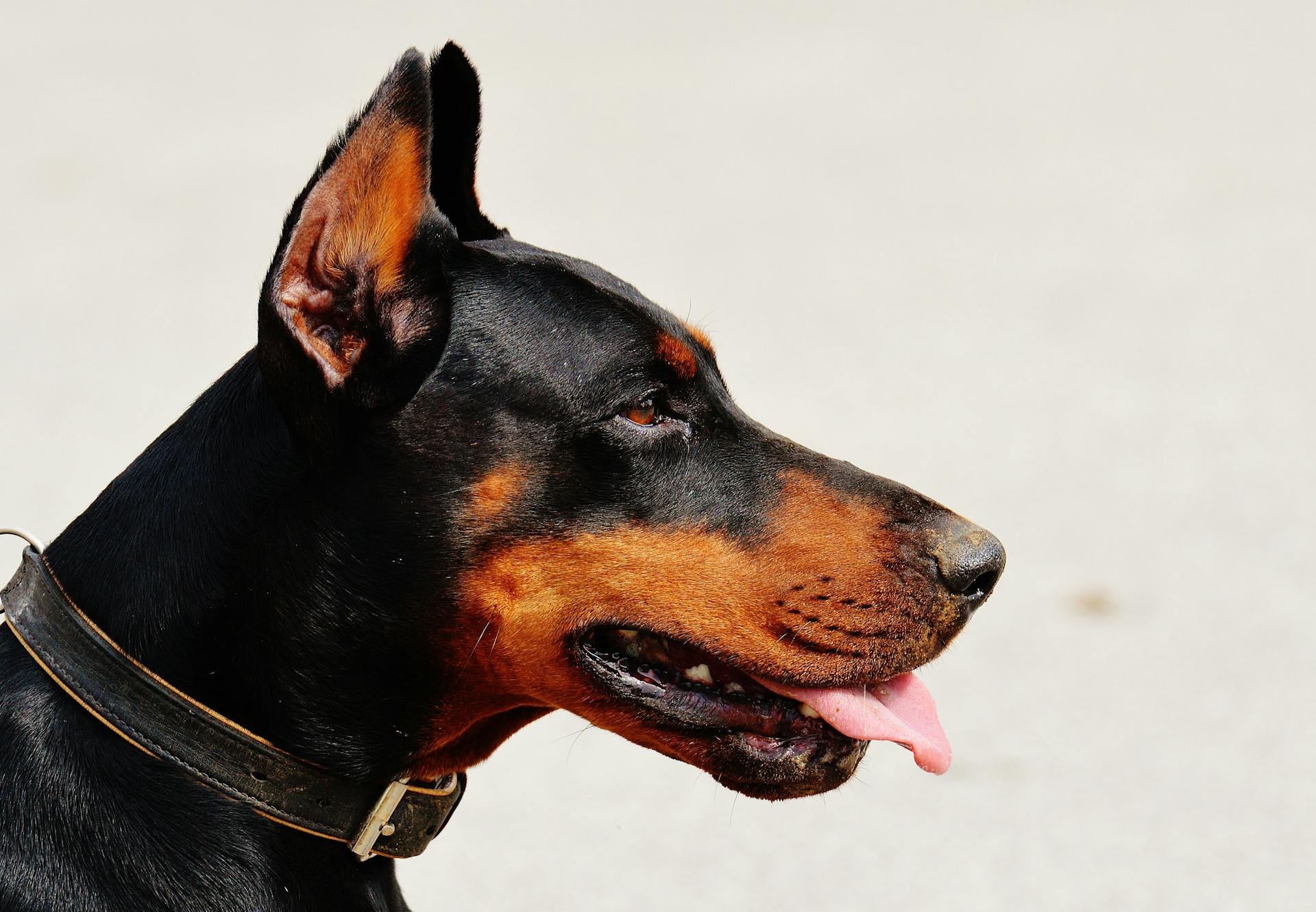
Deciding Between Livestock Guardian Dog Breeds is a crucial step in finding the right companion for your farm. Early consistent training is key to their success.
You need to consider what you need in a farm dog, whether it's a guard dog that will lounge with your livestock or a high-energy breed that can cover a large pasture area. Either way, it's essential to have a clear idea of what you're looking for.
If you have small livestock out on pasture, you'll want a breed that's suitable for that purpose. Determining your needs will help you end up with an excellent guard dog.
For more insights, see: Great Pyrenees Working Dogs
Choosing the Right Farm Equipment
Choosing the right farm equipment will depend on your specific needs and the size of your farm. If you have a small farm, you may not need heavy machinery, but rather manual tools like rakes and shovels.
Your farm's terrain is also a crucial factor in selecting the right equipment. For example, if you have a lot of hills and uneven ground, you'll want equipment with four-wheel drive or all-wheel drive capabilities.
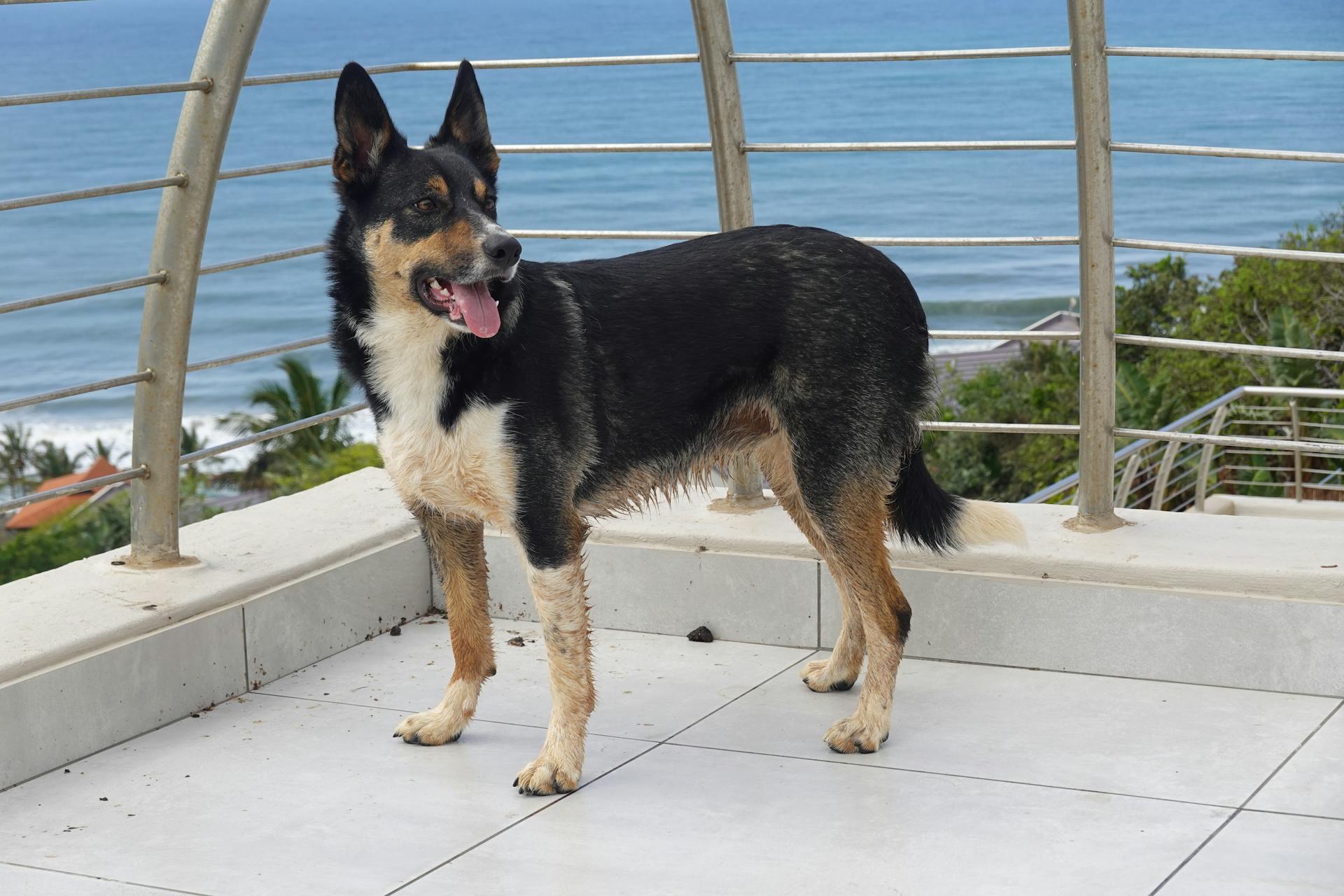
Your energy levels are also important to consider, just like with livestock guardian dogs. If you're not physically able to handle heavy equipment, you may want to consider investing in electric or automated tools.
Taking into consideration your budget is also essential, as it will determine the quality and type of equipment you can afford. You may need to prioritize your needs and make compromises on less essential items.
Your farm's purpose will also influence your equipment choices. If you're growing crops, you'll need different equipment than if you're raising livestock.
Heroes and Equipment
Having a guard dog can be a great way to protect your chickens from predators, but it's essential to choose the right breed for the job.
The Great Pyrenees is a popular choice for guarding chickens due to its natural protective instincts and calm demeanor around humans.
They are large dogs that require regular exercise to stay healthy and happy.
A good guard dog can be a valuable addition to your farm or backyard, but it's crucial to socialize them properly to prevent aggression towards your chickens.
With proper training and care, a guard dog can be a loyal and trustworthy companion to your flock.
Some guard dogs, like the Maremma, are naturally more aggressive towards predators, making them a great choice for protecting your chickens.
Frequently Asked Questions
What is the best guard animal for chickens?
For protecting chickens, Livestock Guardian Dogs and Donkeys are popular and effective guard animal options, offering a strong deterrent against predators.
How do you train a guard dog for chickens?
To train a guard dog for chickens, start by establishing respect from the dog and gradually desensitize it to chickens using distance and a leash. With patience and consistent training, your dog can learn to protect your chickens while remaining calm and focused.
What is the friendliest livestock guardian dog?
The Maremma Sheepdog is a friendly and protective breed that makes a great livestock guardian dog, known for its loyalty and willingness to defend animals from predators. Its sweet and playful nature makes it a great option for farmers and animal owners looking for a gentle guardian.
Sources
- https://www.akc.org/expert-advice/dog-breeds/get-to-know-the-livestock-guardian-dog-breeds/
- https://smallfarmersjournal.com/lessons-learned-life-with-livestock-guardian-dogs/
- https://americanfarmsteadhers.com/livestock-guardian-dog-breeds/
- https://petcontrolhq.com/en-us/blogs/news/best-livestock-guardian-dog-breeds
- https://rootsandboots.com/the-best-livestock-guardian-dog-for-chickens/
Featured Images: pexels.com
